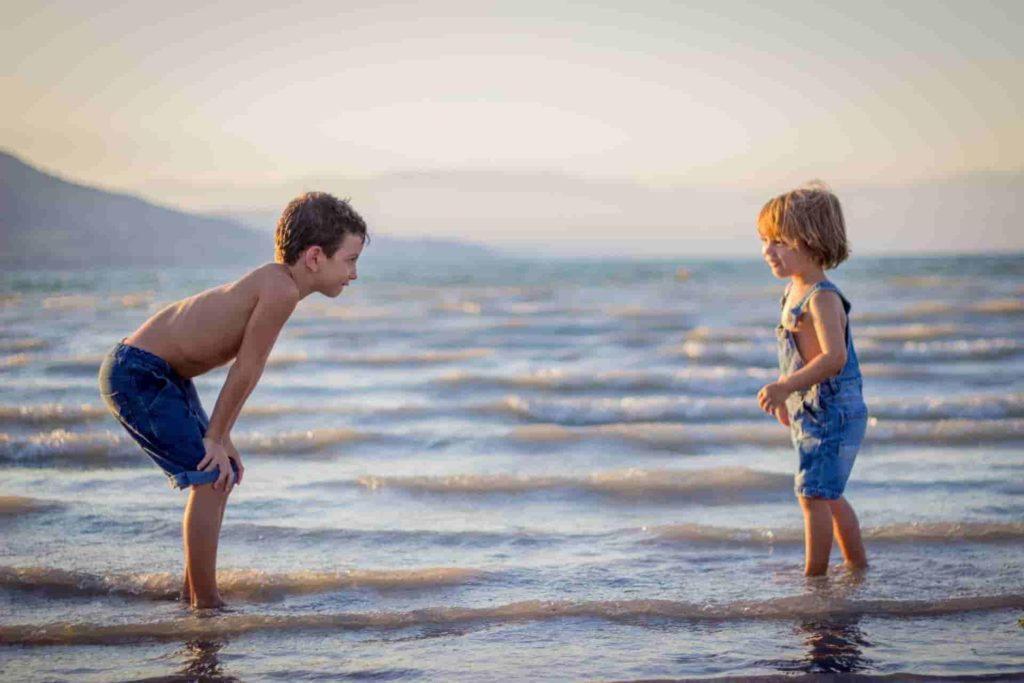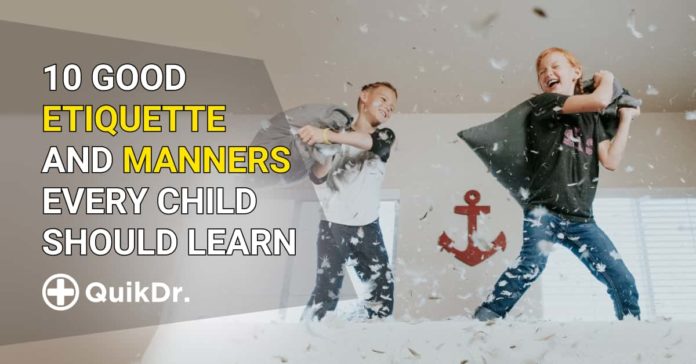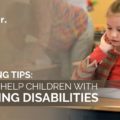Does it really matter to you if your child talks back, acts selfish, or talk extremely rudely to adults? It surely does! There is no doubt that a child who doesn’t know how to be polite will become a teenager who has trouble making friends.
There is no better way to help your child make friends and influence people to teach good manners for kids.
The importance of teaching your children good manners
Raising a child today is a very tough job. With all of the negative influences they have in their lives, it isn’t easy to bring them on the right path. One area that will never be “out of style” when it comes to raising good kids is teaching them manners.
Children who grow up engaging in rude, disrespectful, or impolite behaviour are not well-liked by others, as kids and later as adults. Self-esteem problems often result when peers avoid your child, and it is tough to change others’ perceptions once your kid has been marked as rude or disrespectful.
Good manners are very important in the lives of children. It helps children to make effective interactions with their friends as well as make good impressions on a public platform. This also makes them positive throughout the day.
Therefore, it is the very duty of parents to teach manners to their children. The easiest way to begin is by setting yourself as an example.
10 Etiquette and Manners that Every Child Should Learn

Given below are a list of etiquette and good manners for kids
1. Learn to say ‘please’, ‘sorry’, and ‘thank you’
The three magic words, please, sorry and thank you are so important in our life that we very often forget. These are simple words that portray good manners and leaves everyone with a positive and pleasant feeling. They are necessary for maintaining a healthy relationship in almost every field of life.
Nobody likes to be around rude people. Children need to understand that they are not entitled to anything in life, and if they want anything, they should ask in the nicest and pleasant manner. Adding the word ‘please’ to a sentence will totally change the way it sounds to the person on the receiving end.
In fact, it has the unique power that can change demand to a request. For example saying, “Bring me the book” sounds commanding, rude, and unpleasant but when adding ‘please’, the sentence translates to a more welcoming request: “please bring me the book.”
Children should learn to take responsibility and say sorry when they offend their friends, siblings, elders, or anyone else. Saying the word ‘sorry’ brings forgiveness, peace, and healing into any unpleasant situation. Kids should understand that saying sorry doesn’t make them weak, but, it is a display of strength and a good sense of responsibility.
Saying ‘thank you’ for every good deed will help kids grow into independent adults with less sense of entitlement. The word ‘thankyou’ represents gratitude and honour. Kids should learn to say thank you as a form of gratitude when someone gives something or does something.
2. Basic table manners
It is essential that children should learn proper table manners. Good table manners ensure that both the guests and hosts are comfortable at the table. Good table manners for kids include not reaching over a table to grab a dish, the proper way to use a napkin, and not to chew with their mouth open.
Table manners can really affect children’s health. It can result in the spread of germs and illness. Avoid watching television while having food. This is because when we pay more attention to food, we are more likely to enjoy it. If not, it will make you eat more and enjoy less.
3. Ask for permission
Parents should not always allow their kids to do whatever they want. Make sure that your kids ask your permission before going out to play, leave the dinner table, or take a bar of chocolate from the chocolate box. This is one of the ways to make sure that your kids have a strong foundation for knowing the way to be a polite person.
4. Help others

It is very important to teach your children how to help others. The very act of helping can be anything, from small acts of kindness, such as holding your sick friend’s bag to supporting someone when they are having a tough time.
5. Respect your elders
Respecting elders can be considered as a very good habit to imbibe in children. Talk to elders in a polite manner and never disrespect hem. If two elders are talking, a child should not interrupt them and should always wait for a pause and say “excuse me.”
6. Speak with kindness
Children should learn to speak with kindness to their friends, siblings, elders and each and everyone around them. If you are a person who is poor at finding the right words, then think well before you speak. Learn to avoid negative remarks that may insult someone else.
7. Learn to give genuine compliments

Learning to give and take a compliment is a very important emotional intelligence skill. Always think of giving genuine compliments when you meet someone. Always be generous with warm greetings, sincere words of praise, or whatever is appropriate to the occasion.
8. Respect others privacy
It is important to teach your kids to respect other peoples privacy, boundaries and personal space. Kids often tend to just barge in on others and ask whatever it is that they please. Make sure that they learn to knock on doors before entering a room.
9. Be punctual
Children should appreciate the value of their time, as well as others. They should be punctual in every activity they do, such as going to school, having food, sleeping habits, etc. If they reach late to school, they should learn to inform their teachers beforehand.
10. Do not criticize others
Children should avoid every form of negativity. They should never indulge in gossip. If they disagree with someone or something, they should do it in a respectful way. When you criticize someone, there are chances that they get hurt.
Sometimes, the more you criticize, the more unhappy you get. Learn to be realistic and see the good in others. Kids should think before they speak.
Never forget to teach the good manners for kids mentioned above.
Apart from these ten etiquette and good manners for kids, there are others too – be generous, be thoughtful, don’t be bossy, don’t use filthy language or curse words, covering mouth and nose while sneezing, etc.
Parents Role
Parents act as a primary source of teaching good manners and etiquette to kids.
Given below are some ways through which parents can guide their child towards good etiquette and teach manners:
- Have dinner conversations
- Make your kids regularly say “thank you” and “please
- Make them write thank you cards
- Limit the usage of smart phone and other electronic devices
- Teach your kids the importance of empathy
Of course, your child will only learn by watching you. As a parent, take a good look at your own behaviour and set yourself as a good example. Try evaluating your self (manners and conduct) and make necessary adjustments.
Doing this will make your child see you as a role model to follow as he/she learns how to properly interact with people.
If your child frequently disobeys rules or if you find any difficulty in handling the way your kids behave, consult a doctor online.






